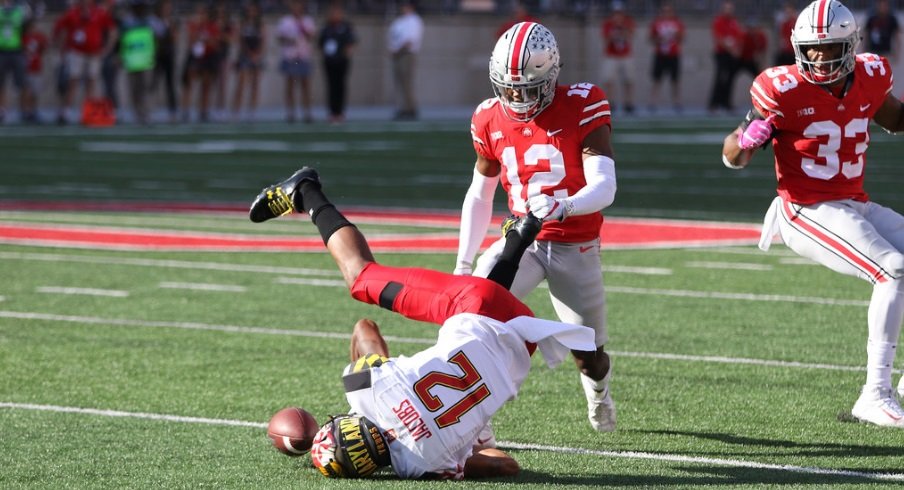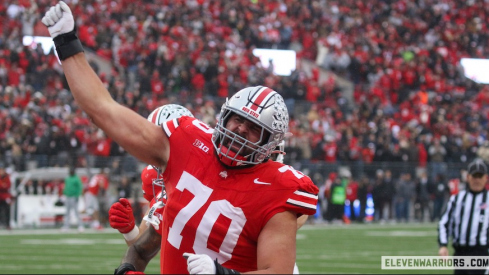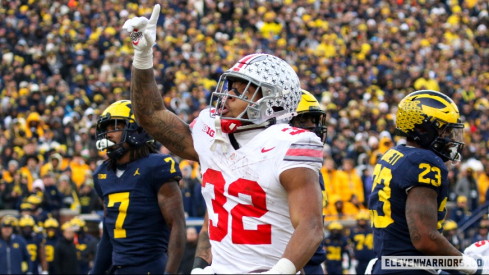I am an unabashed supporter of making "targeting" a penalty.
Which is controversial; many people have an issue with it being called at all. The reasons for this range from the knee-jerky ("Football is becoming wussified, back in my day we ground our brains into a fine paste incapable of remembering our home addresses and WE LIKED IT") to the more sensical ("Targeting calls are applied in a haphazard and illogical way, and players and coaches and refs seem utterly confused as to what actually warrants an ejection").
The first argument isn't worth addressing, but as for the second? I've never felt that poor enforcement of a rule is enough to say that the rule itself shouldn't exist. The health of players has to take precedence over anything else, not just for the protection of the people who play the sport, but for the long-term health of the sport itself.
Still, college football has to figure out what the hell to do about stuff like this:
Last summer, Ramzy wrote about this particular incident, saying:
Targeting should be uncontroversial but for the humans who interpret its definition. Helmet-to-helmet, launching, defenselessness - we have the technology and we don't even need it. If you have football eyes it's quite easy to delineate the clean and currently-legal hits from ones that are illegal or unnecessarily violent. As the definitions evolve, those eyes will adjust. Ward was seemingly penalized because of the physics involved with Jacobs pinwheeling, which is not included anywhere in the definition of targeting.
This is backed up by the Big Ten later saying that Ward's ejection was an error and shouldn't have happened. Neat! Except... targeting as a penalty, and one that comes with an ejection, isn't going away.
Last week the NCAA decided to not only keep targeting as a general rule, but also strengthen potential penalties for players who commit such fouls with regularity. The NCAA buries the absolute hell out of the lede here (emphasizing the aspect of video review for each targeting call, which seems like already was happening anyway), but the juicy bit is when they state that "Players who commit three targeting fouls in the same season are subject to a one-game suspension."
This in of itself isn't a terrible idea. Players who repeatedly violate a rule put in place for the safety of others eventually lose the benefit of the doubt and should probably face further punishment. Plus, this exists in tandem with other NCAA rule changes for the 2019 season, most notably one that attempts to shorten overtime games.
The problem is that while well-intentioned, we've repeatedly seen the NCAA and its officials make the wrong call when it comes to targeting, and as seen above they admitted as such when it came to the case of Denzel Ward.
But if the NCAA is going to suspend players based on a poorly-applied rule, then each incidence of targeting (which still presumably will result in an ejection if it's deemed egregious) should be subject to review after the fact. No one should be suspended because of poor application of the rules.
That's the easy part.
The hard part, for the NCAA and football at large, is figuring out what exactly can be done to make football safer both in terms of perception and in reality to help preserve the viability of the sport long term.
Because the truth is that changes like making targeting a penalty and speeding up overtime pale in comparison to some of the things that might be necessary to make football "safer;" or, at least as safe as a contact sport can be.
Greg Schiano, for example, proposed in 2011 that college football make wholesale changes to kickoffs, essentially advocating to eliminate them in favor of punts (and also doing away with onside kicks altogether). His proposal was inspired by Eric LeGrand, a former player of his at Rutgers who was paralyzed in 2010. You might've heard of Schiano's proposal before, and it's interesting to me for two reasons.
First, it has legs. Every time you hear about NCAA rule changes for the safety of players, someone (including myself, right here in this article) mentions Schiano's idea and every year it seems more and more plausible. It's been sticking around for eight years now, and eventually someone in the NCAA is going to take it as seriously as internet bloggers do.
Secondly, it represents the kind of major change that might be as difficult to enact as it could be necessary for the future of the sport. And fans, coaches, and players don't like change. For fans, a change that radical fundamentally alters an element of something they enjoy, and they can't be sure if they'd like it or not. For coaches and players, it would force them to un-learn and re-teach an element of the sport that has existed for generations.
What bothers me about the NCAA's new targeting guidelines isn't the idea of the penalty itself, it's the idea that suspending players for often misapplied infractions will make the sport as a whole safer in the long-run. It is a band-aid that seeks to avoid the tougher conversation that the sport must eventually have about fundamental aspects of football.
Is targeting a penalty caused by anger or frustration, and therefore the fault of the player? Or is targeting caused by years of bad coaching and reinforcement of bad habits, and therefore the fault of coaches and staff? One option is a lot easier to punish, but the other asks more difficult questions that the NCAA is going to need to figure out.
In the meantime, players like Denzel Ward will continue to receive penalties and suspensions because of a poorly understood and enforced half-measure.


